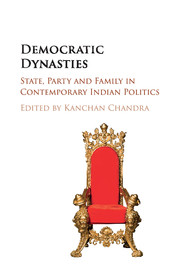Book contents
- Democratic Dynasties
- Democratic Dynasties
- Copyright page
- Dedication
- Contents
- Figures
- Tables
- Contributors
- Glossary
- Book part
- Prologue
- 1 Democratic dynasties
- 2 The “old regime” confronts democracy
- 3 A sign of backwardness?
- 4 Dynasticism across Indian political parties
- 5 Women, dynasties, and democracy in India
- 6 Disadvantaged groups, reservation, and dynastic politics
- 7 Why “Forward Castes” have a dynastic advantage
- 8 Dynasty and “paths to power”
- Book part
- Index
- References
8 - Dynasty and “paths to power”
Published online by Cambridge University Press: 05 June 2016
- Democratic Dynasties
- Democratic Dynasties
- Copyright page
- Dedication
- Contents
- Figures
- Tables
- Contributors
- Glossary
- Book part
- Prologue
- 1 Democratic dynasties
- 2 The “old regime” confronts democracy
- 3 A sign of backwardness?
- 4 Dynasticism across Indian political parties
- 5 Women, dynasties, and democracy in India
- 6 Disadvantaged groups, reservation, and dynastic politics
- 7 Why “Forward Castes” have a dynastic advantage
- 8 Dynasty and “paths to power”
- Book part
- Index
- References
- Type
- Chapter
- Information
- Democratic DynastiesState, Party and Family in Contemporary Indian Politics, pp. 238 - 264Publisher: Cambridge University PressPrint publication year: 2016

